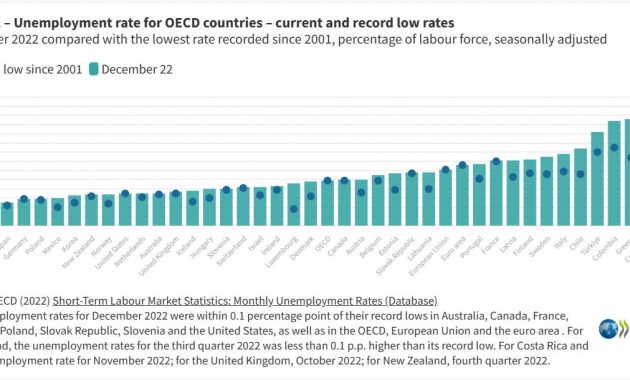World Unemployment Rates Decline, But These 4 Countries Still Struggle

The world’s unemployment rate has been stable at a record low of 4.9% in December 2022, according to the Organization for Economic Co-operation and Development (OECD).
This is good news for the global community, with the number of unemployed people falling to 33.9 million worldwide.
The OECD reports that this rate has remained steady since 2001, and unemployment rates remain at historic lows of 6.1% and 6.6% in the European Union and the euro area, respectively. The biggest decline in unemployment rates was seen in Austria, with stable or declining rates in more than 70% of euro area countries.
However, four countries are still struggling with increasing unemployment rates: Colombia, Israel, Korea, and Turkey. In Colombia, the unemployment rate rose from 2.73 million in 2021 to 2.81 million in December 2022.
Israel and South Korea also saw increases, with 186,000 and 948,000 unemployed people, respectively. Turkey, which is recovering from an earthquake, recorded 3.63 million unemployed people in 2022, up from 3.58 million in the previous year.
In contrast, Canada and the United States saw a decline in unemployment rates, while Australia, Japan, and Mexico’s rates stabilized. The United States recorded the highest number of unemployed individuals, with 5.7 million people at the end of 2022.
Meanwhile, unemployment in the European Union reached 13.14 million people, with Spain having the highest number of unemployed individuals, totaling 3.0 million, followed by France with 2.1 million inhabitants.

Despite the positive news, unemployment remains a global concern, ranking fourth among the world’s most significant issues, alongside inflation and poverty. According to the Ipsos survey ‘What the World Is Worried About’ in February 2023, 27% of people worldwide admitted that unemployment was a problem in their country. South Africa remains the country most concerned about unemployment, with 69% of respondents worried about it. This concern has been ongoing since April 2021, with worries never falling below 60%.
Kelly Arnold, Country Manager for Ipsos in South Africa, explains that unemployment in the country has been a problem for decades, and the Covid-19 pandemic has only worsened the situation. Between 3-4 million South Africans lost their jobs due to the pandemic, and these jobs have not returned. With the cost of living increasing faster than the official rate of inflation, 70% of South Africans in a recent poll reported being employed but seeing wage increases below inflation.
Italy and Spain are also at the top of the list of countries concerned about unemployment, with 43% and 37%, respectively.
Although many companies have reversed their course with layoffs and freezes on hiring due to Covid-19’s impact on global supply chains, workers are also reluctant to return to the office. Most of the workforce now has flexible jobs that allow them to work remotely.
The rise of automation and robots in the workplace also raises concerns about job security. According to the World Economic Forum, 85 million jobs will be replaced by the robot revolution by 2025, but 97 million new jobs will also be created.
The International Monetary Fund (IMF) has emphasized that inflation will significantly impact the labor market in the future. As such, it is crucial to remain vigilant and prioritize policies and strategies that will address unemployment concerns in the long term.




